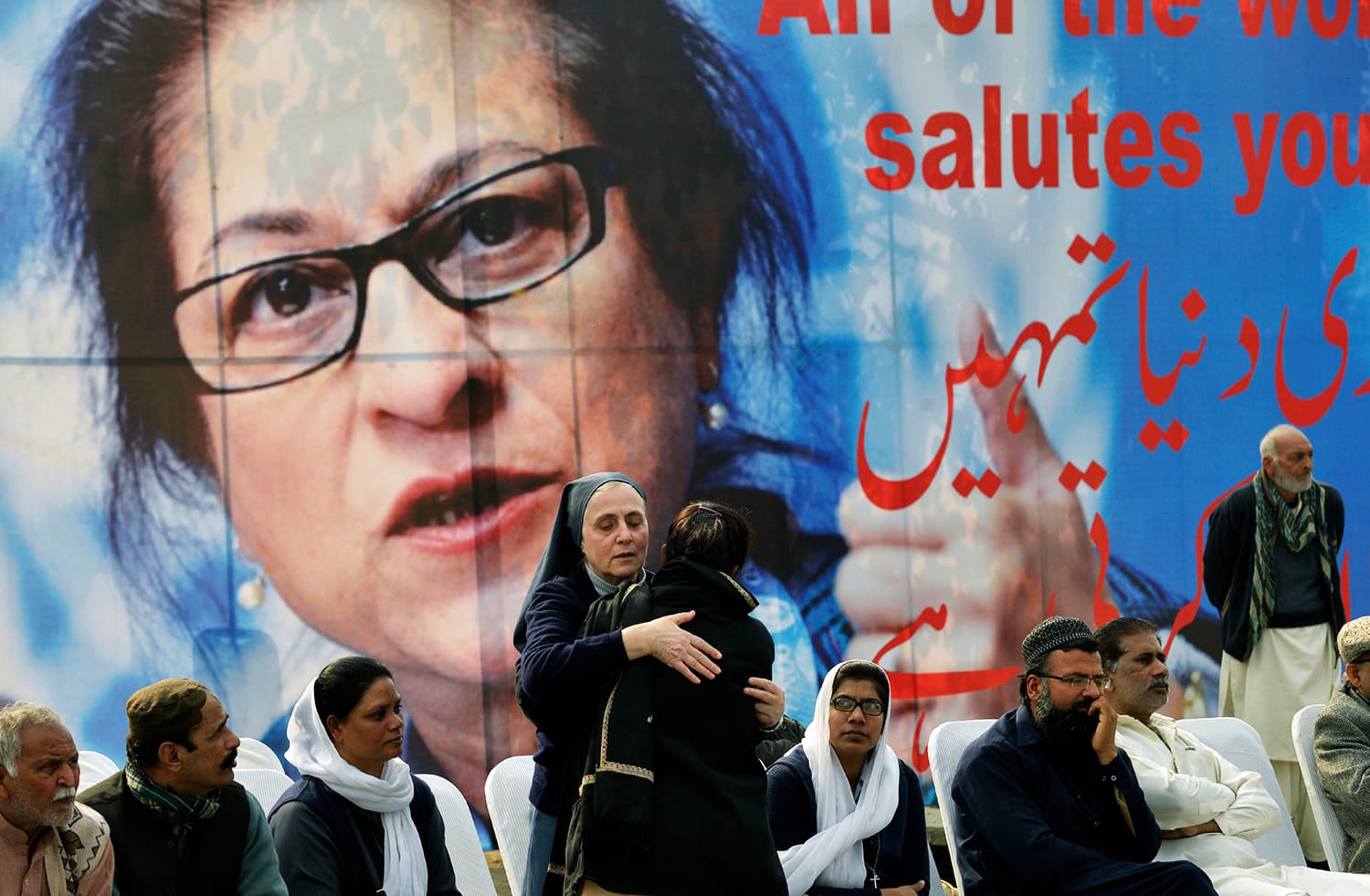The funeral was scheduled for 3pm. On a regular day, the Gaddafi Stadium is about a 12-minute drive away. We left at exactly 1:45pm. It was everyone’s last chance to see her. Obviously, the traffic would be terrible.
We got as close as we could to the stadium gates in our car, and then started making our way into the crowd on foot. The ambulance carrying her wasn’t too far away. It moved slowly, aware of the gravity of the woman it was driving.
Asma Jahangir passed away suddenly on Sunday, 11th of February. She had turned 66 about two weeks ago. Her daughter has confirmed it was a heart attack.

On Monday evening, rumours spread that Asma's funeral would be led by her sister and long-time activist Hina Jilani. That only women would shoulder her shroud.
Every woman I know held her head a little higher when they heard of this possibility, which only Asma could make seem plausible. Had she really done it, yet again?
I told this to my colleague on the way to the funeral. He responded, “It’s never going to happen.”

Gaddafi Stadium is used to noise from the cricket matches it hosts on occasion. But yesterday, it was quiet. Thousands walked, hushed. Perhaps we were hoping for the slightest noise that her death was a ruse, fake news, as baseless as all of the allegations against her.
Maybe we were quietening down to see if anyone would speak up to claim her space. Or maybe, it was what losing a champion sounds like.
We shuffled around the perimeter of the stadium, craning our necks to see beyond the person immediately in front of us. I caught many a whisper – what’s going on? How much more do we have to walk? Where is she?
We didn’t know where we were going or where the walk would end. But we knew we were moving towards Asma. And for many, that’s all they really needed to know.

Drones hovered over our heads, and arms holding cell phones were held aloft, filming the crowd. Cameras and media crews occupied prime real estate around Asma's body.
Unlike most Pakistani public spaces, you could see as many women as men. You notice this a lot more if you are a woman. There was a ballooning in my chest, ready as I was to see Hina lead the prayer.
This didn’t happen. And to compound the disappointment, the men, used to occupying as much space as desired, sprawled themselves around the wooden cot. They naturally assumed we would just back away, like we always do.
But this was, after all, Asma's funeral.
A woman next to me asked the women around her to make space for a line. Then she raised her voice slightly to spread the instruction. Soon, she and three other women were shouting over the men, demanding more room.
More and more people began to shuffle in the space, stepping to their right, stepping to their left, moving forward, moving backwards. Asma’s daughter Munizae asked the men to cooperate.

Rows upon rows formed. Silence fell over us again. The Imam began his prayer.
I suddenly realised, this was the first time I had offered a prayer that was led by a male Imam. It did not feel out of place. It might have, had I been the only woman there. But this was Asma's funeral.
Men and women praying together, shoulder to shoulder, was Asma's last subversive act. It felt like an encore. This small rebellion has made some people angry. It wouldn’t be Asma if it didn’t.
And that has been a consistent pattern in her life. Some were annoyed by her, others were outraged, and there was no shortage of detractors.
They did not give her special treatment as a member of the 'fairer sex.' Her battles were those reserved for men. She was a credible threat. They did not go easy on her. They talked about her like they would talk about a man.

In the crowd, I noticed many women were sporting bright yellow scarves, including Tehmina Durrani. Upon closer inspection, there was Urdu text printed on them. I tapped a woman in front of me to ask what they represented.
She must have been about 60 years old. “It’s for members of the Women’s Action Forum,” she said. “Have you heard about it?”
I blinked at her. I didn’t think there was a girl alive in Pakistan who didn’t know about WAF and their great work. I wanted to be offended. But I realised, to live in a world where these hard-fought freedoms could be taken for granted, was its own kind of privilege. This is what Asma left behind.
Growing up, she was the only female lawyer I knew of. But in the sea of mourners, I was surrounded by female lawyers.
I was accompanied by Sarah Belal, a relentless anti-death penalty activist I have the privilege to work with. I spotted Nighat Dad, tireless in defending our digital rights.
Syeda Ghulam Fatima, who has risen from being a bonded labourer herself, and has been fearless in liberating modern-day brick slaves, stood right next to Asma's family.
Asma’s spirit was everywhere, just as it continues to be in every quiet act of rebellion for female lawyers in the courts. Whether it’s smoking a cigarette or raising your voice in the courtroom, it feels like it has been attempted before. You always hear them whisper – “Just like Asma Jahangir.”
So when the men carried her body, as tradition would have it, it didn’t hurt as much. She had done her job.
On our way out, I noticed a gardener transfer a sapling from a pot into the ground near the entrance of the stadium. When any great tree falls, the best we can do is to plant more.














































